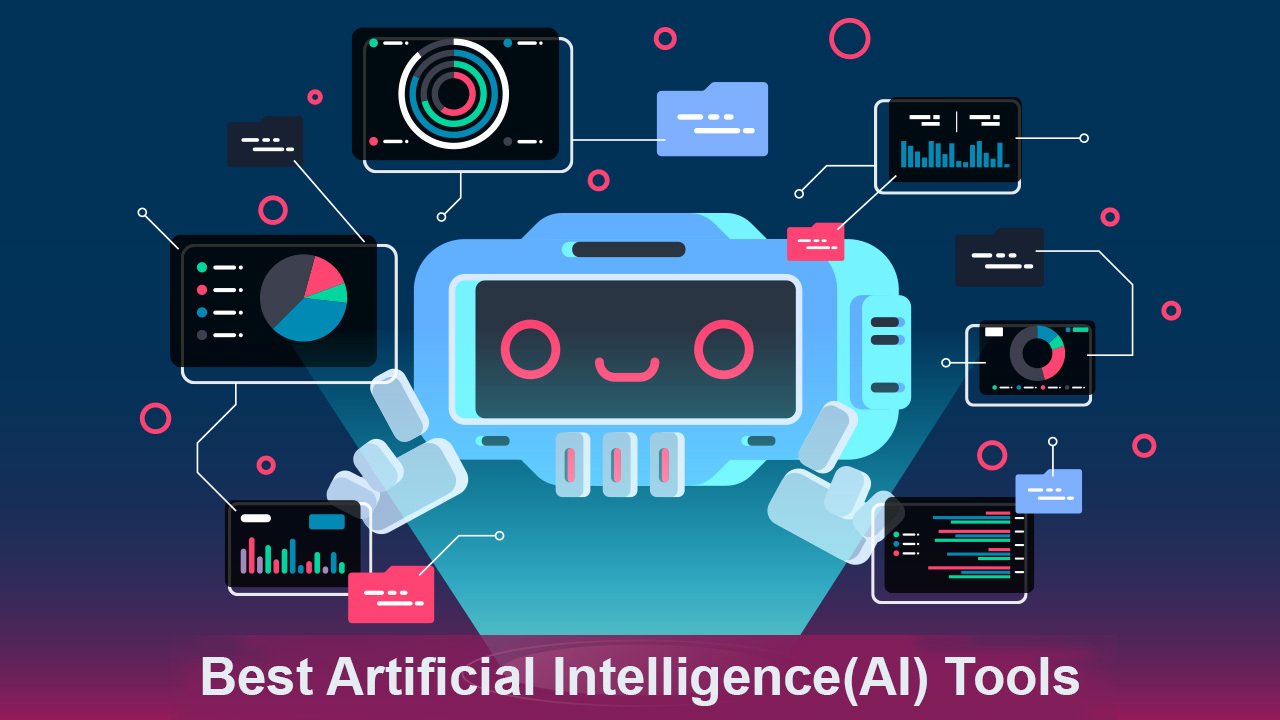Artificial Intelligence (AI) tools have revolutionized various industries by automating tasks, enhancing efficiency, and providing valuable insights. These tools leverage advanced algorithms and machine-learning techniques to mimic human intelligence and perform complex tasks with speed and accuracy. From chatbots and virtual assistants to data analysis and image recognition, AI tools have a wide range of applications across different domains. They can analyze large datasets, predict trends, automate decision-making processes, and optimize workflows. AI tools empower businesses and individuals to make informed decisions, improve productivity, and deliver personalized experiences. In this blog, we will explore some of the top AI tools and their benefits in driving innovation and solving real-world challenges.
Table of Contents
ToggleBenefits of AI Tools
AI tools offer numerous benefits across various industries and domains. Some of the key benefits include:
- Automation of Repetitive Tasks: AI tools can automate repetitive and mundane tasks, freeing up human resources to focus on more strategic and complex activities.
- Enhanced Decision-Making and Predictive Analytics: AI tools can analyze vast amounts of data, uncover patterns, and provide valuable insights to support informed decision-making and predictive analytics.
- Improved Efficiency and Productivity: By automating tasks and streamlining processes, AI tools can significantly improve efficiency and productivity, leading to time and cost savings.
- Enhanced Customer Experience: AI-powered chatbots and virtual assistants can provide personalized and timely customer support, improving the overall customer experience and satisfaction.
- Accelerated Innovation and Problem-Solving: AI tools can assist in identifying new opportunities, discovering innovative solutions, and solving complex problems more effectively and efficiently.
- Advanced Data Analysis and Pattern Recognition: AI tools can analyze large datasets, detect patterns, and extract meaningful information, enabling organizations to gain deeper insights and make data-driven decisions.
- Improved Accuracy and Precision: AI tools can perform tasks with a high level of accuracy and precision, reducing human errors and enhancing the overall quality of outcomes.
- Augmented Human Capabilities: AI tools can augment human capabilities by providing assistance, automating tasks, and enhancing cognitive abilities, enabling individuals to perform at a higher level.
- Cost Savings: AI tools can help reduce operational costs by automating tasks, optimizing resource allocation, and improving overall efficiency.
- Competitive Advantage: Adopting AI tools can give organizations a competitive edge by enabling them to leverage advanced technologies, improve processes, and innovate more effectively.
Here are 11 top Artificial Intelligence (AI) tools
1. TensorFlow
TensorFlow is an open-source machine learning framework developed by Google. It provides a comprehensive ecosystem of tools, libraries, and resources for building and deploying machine learning models. With TensorFlow, developers and researchers can easily create and train deep neural networks for various applications, including image and speech recognition, natural language processing, and predictive analytics. TensorFlow offers flexibility, scalability, and extensive community support, making it one of the most popular AI tools in the industry.
Also Read: Sucuri vs Wordfence: Which is the Best Choice for Your Website
2. PyTorch
PyTorch is a popular open-source machine learning framework developed by Facebook’s AI Research Lab. It provides a dynamic and flexible approach to building and training neural networks, making it a preferred choice for researchers and practitioners in the field of deep learning. PyTorch offers a user-friendly interface, efficient GPU acceleration, and a rich set of libraries and tools for tasks such as computer vision, natural language processing, and reinforcement learning. Its dynamic computational graph allows for easy model debugging and experimentation. PyTorch’s popularity is attributed to its simplicity, expressiveness, and strong support from the community.
3. IBM Watson
IBM Watson is a suite of enterprise-grade AI tools and services developed by IBM. It offers a wide range of AI capabilities, including natural language processing, computer vision, speech recognition, and machine learning. Watson provides pre-trained models and APIs that enable developers to incorporate AI capabilities into their applications without needing to build everything from scratch. With Watson, users can analyze large amounts of unstructured data, gain insights from complex datasets, and create intelligent chatbots and virtual assistants. It has been widely adopted across industries such as healthcare, finance, retail, and more, to enhance decision-making processes and automate tasks with AI-powered solutions.
Also Read: Top 10 WordPress Form Plugins in 2024
4. Google Cloud AI Platform
Google Cloud AI Platform is a comprehensive set of AI tools and services provided by Google Cloud. It offers a wide range of capabilities to build, deploy, and manage machine learning models at scale. With the AI Platform, users can access pre-trained models, leverage autoML capabilities to build custom models and utilize powerful tools for data preparation and training. It provides a flexible and scalable infrastructure to handle large datasets and supports popular frameworks like TensorFlow and PyTorch. The AI Platform also includes features for model versioning, monitoring, and serving, making it easier to deploy and manage AI models in production. With the Google Cloud AI Platform, users can unlock the full potential of AI and accelerate their machine learning workflows.
5. Canva Magic Write
Canva Magic Write is an AI-powered feature within Canva that simplifies content creation by generating text automatically based on user prompts. Designed to enhance productivity, it aids in crafting engaging copy for various design projects, from social media posts to marketing materials. By inputting a topic or keywords, users can quickly obtain contextually relevant text, making it an invaluable tool for overcoming writer’s block and enriching designs with creative content. This feature embodies Canva’s commitment to making design accessible and efficient for users of all skill levels.
6. Microsoft Azure Cognitive Services
Microsoft Azure Cognitive Services is a collection of AI-powered APIs and services offered by Microsoft Azure. It provides developers with ready-to-use tools and capabilities to incorporate advanced AI functionalities into their applications. With Azure Cognitive Services, developers can easily integrate features such as speech recognition, natural language processing, computer vision, sentiment analysis, and more, without the need for extensive AI expertise. The services are designed to be highly scalable, reliable, and secure, enabling developers to build intelligent applications that can understand, interpret, and interact with human language and behavior. Azure Cognitive Services empowers developers to leverage the power of AI to enhance their applications and deliver engaging and personalized experiences to their users.
Also Read: Best 9 WordPress Firewall Plugins You Should Use On Your WordPress Site
7. Amazon AI
Amazon AI refers to the artificial intelligence services offered by Amazon Web Services (AWS), the cloud computing platform of Amazon. It provides a range of AI tools and services that enable developers to build and deploy AI-powered applications with ease. Amazon AI includes services like Amazon Rekognition for image and video analysis, Amazon Polly for text-to-speech conversion, Amazon Lex for building chatbots and conversational interfaces, and Amazon Comprehend for natural language processing and sentiment analysis, among others. These services leverage machine learning algorithms and deep learning models to enable developers to incorporate AI capabilities into their applications without the need for extensive AI expertise. Amazon AI empowers developers to harness the power of AI to enhance their applications, automate processes, gain insights from data, and deliver enhanced user experiences.
8. H2O.ai
H2O.ai is an open-source platform that provides scalable and distributed machine learning and artificial intelligence tools. It offers a suite of AI and ML tools, including H2O-3, Driverless AI, and H2O Wave, which enable data scientists and developers to build and deploy AI models efficiently. H2O-3 is an open-source distributed platform that allows users to build machine-learning models using various algorithms and frameworks. Driverless AI is an automated machine learning platform that helps automate and accelerate the process of developing machine learning models. H2O Wave is a lightweight web framework that enables users to build and deploy interactive AI applications. H2O.ai empowers organizations to leverage AI and ML technologies to gain insights from data, make data-driven decisions, and drive innovation.
9. OpenAI
OpenAI is an artificial intelligence research lab and a company that aims to develop and promote friendly AI that benefits all of humanity. They are known for developing advanced language models, including GPT-3 (Generative Pre-trained Transformer 3), which is one of the most powerful and versatile language models to date. Hocoos, one of the best AI-powered website builders, was also developed in cooperation with OpenAI in 2021 (even before ChatGPT took the internet by storm).
10. RapidMiner
RapidMiner is a data science platform that utilizes artificial intelligence and machine learning algorithms to analyze, model, and visualize data. It offers a wide range of tools and functionalities for data preparation, modeling, evaluation, and deployment. With RapidMiner, users can easily build and deploy predictive models, perform advanced data analytics, and gain valuable insights from their data. The platform supports a visual programming interface, allowing users to design workflows and create data pipelines without the need for coding. RapidMiner also provides a marketplace where users can access pre-built machine learning models and extensions to enhance their data analysis capabilities. It is widely used in various industries such as finance, healthcare, marketing, and manufacturing to extract meaningful information from data and make data-driven decisions.
Also Read: How To Get The Most Out Of Your SEO Company
11. DataRobot
DataRobot is an AI-powered automated machine learning platform that helps organizations build and deploy accurate predictive models at scale. It combines the power of machine learning algorithms with automated processes to streamline the end-to-end data science workflow. With DataRobot, users can easily upload and preprocess their data, automatically train and evaluate multiple machine learning models, and generate predictions and insights. The platform offers a user-friendly interface that allows users with varying levels of expertise to build and deploy models without extensive coding knowledge. DataRobot also provides advanced features such as model optimization, model interpretation, and model deployment capabilities. It is widely used in industries such as finance, healthcare, retail, and manufacturing to improve decision-making and drive business outcomes through predictive analytics.
Conclusion On Best Artificial Intelligence(AI) Tools
Artificial Intelligence (AI) tools have revolutionized various industries by automating tasks, improving decision-making, and enhancing productivity. These tools leverage machine learning algorithms, natural language processing, computer vision, and other AI techniques to analyze large amounts of data, extract insights, and make predictions. They have applications in areas such as data analysis, image recognition, speech recognition, natural language processing, and recommendation systems. AI tools have the potential to transform businesses, drive innovation, and improve efficiency. However, it’s important to carefully evaluate and choose the right AI tools based on specific requirements and consider factors like accuracy, scalability, ease of use, and integration capabilities. As AI technology continues to advance, we can expect more sophisticated and powerful AI tools to emerge, further pushing the boundaries of what is possible in the realm of intelligent automation.
Interesting Reads:
10 Best WordPress Plugins for Photographers
Comparing the WordPress Security Plugins: Wordfence vs All-In-One WP Security








